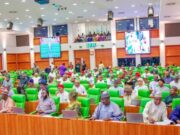Human rights advocate and Senior Advocate of Nigeria (SAN), Femi Falana, has urged Nigerians to actively report individuals and officials both in the private and public sectors who violate the Anti-Torture Act of 2017.
In a statement released on Sunday, Falana condemned the ongoing torture and mistreatment of citizens, despite both constitutional and international legal protections.
He highlighted that, despite clear protections in the Nigerian Constitution and global human rights agreements, the fundamental rights of vulnerable groups such as children, impoverished citizens, and criminal suspects are still regularly violated across the country.
Falana referenced past violations, including the infamous Mogaji v. Board of Customs & Excise case of 1982, where armed officials violently raided Lagos markets in search of contraband.
He described this as a blatant violation of constitutional protections against cruel and degrading treatment.
Although Nigeria enacted the Anti-Torture Act in 2017, Falana emphasized that torture remains deeply embedded in law enforcement practices across the nation.
Drawing on a 2007 UN report, he cited various forms of police abuse, including physical beatings, hanging prisoners from ceilings, and the denial of basic necessities like food and medical care.
The Act itself criminalizes such practices, with Section 1 mandating that the government uphold the right to freedom from torture for all individuals, including detainees and prisoners.
The law imposes severe penalties for offenders, including a 25-year prison sentence for torture, and a potential murder charge if torture leads to death.
Despite these legal provisions, Falana expressed concern that forced confessions are still common, often made without the presence of legal counsel, leading to unfair trials.
To tackle these abuses, Falana called for the involvement of institutions such as the National Human Rights Commission, the Nigerian Bar Association, and other human rights groups to mobilize citizens in exposing and reporting these violations.
In his final remarks, Falana stressed the importance of holding accountable those who violate the Anti-Torture Act: “It is critical for Nigerians to stand against the culture of impunity and demand respect for human dignity in the country.”

















